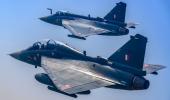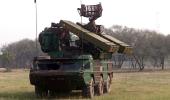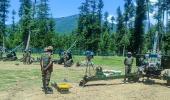Low-level lightweight radars; very short-range air defence systems (launchers and missiles); remotely piloted aerial vehicles; loitering munitions, including vertical take-off and landing systems; different kinds of drones; bullet-proof vests; ballistic helmets; quick-reaction fighting vehicles -- heavy and medium; and night sights for rifles (aiming devices that are visible in low light).

The ministry of defence is buying domestically produced goods worth billions of rupees for the Indian Army's counter-terrorism operations in the future.
Around 13 contracts -- together worth Rs 1,981.90 crore (Rs 19.81 billion) -- have been finalised against a sanctioned outlay of Rs 2,000 crore (Rs 20 billion) for the Indin Army, under the emergency-procurement mechanism, the ministry said in a statement on Tuesday.
'The acquisitions were completed within compressed timelines to ensure rapid capability augmentation,' the defence ministry statement said, without providing details about the expected delivery.

It is also unclear if the purchase is linked to the replenishment of hardware used during Operation Sindoor on May 7, when India struck Pakistan after the Pahalgam terrorist attack on April 22, which India said, had 'cross-border linkages'. The fighting lasted until May 10.
Although deliveries of defence goods in India typically take many years, the emergency- procurement route usually takes only one year to be completed, according to military sources.
They said most orders for this batch were placed in the past 30 days.
A rule of such 'emergency purchases' is that all equipment must have been credibly tested in the past.
The Indian military used a combination of short-and-long-range weapons and air defence systems, foreign and indigenously built, during Operation Sindoor.
The newly ordered integrated drone detection and interdiction systems include low-level lightweight radars; very short-range air defence systems (launchers and missiles); remotely piloted aerial vehicles; loitering munitions, including vertical take-off and landing systems; different kinds of drones; bullet-proof vests; ballistic helmets; quick-reaction fighting vehicles -- heavy and medium; and night sights for rifles (aiming devices that are visible in low light).
This purchase will strengthen the army's operational readiness -- situational awareness, lethality, mobility and the protection of troops deployed in counter-terrorism environments -- and provide it with modern, mission-critical and 'completely indigenous systems' to meet emerging security challenges, according to the defence ministry statement.
Urgent capability gaps can be bridged and the timely induction of vital operational equipment is ensured through emergency procurement, it said.
Feature Presentation: Ashish Narsale/Rediff











